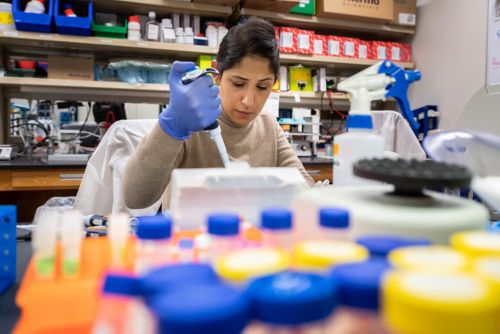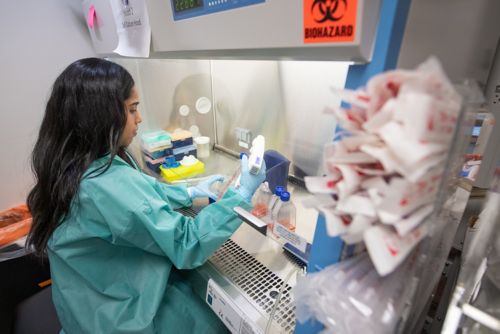St. Jude Family of Websites
Explore our cutting edge research, world-class patient care, career opportunities and more.
St. Jude Children's Research Hospital Home

- Fundraising
St. Jude Family of Websites
Explore our cutting edge research, world-class patient care, career opportunities and more.
St. Jude Children's Research Hospital Home

- Fundraising
Esther A. Obeng Lab
Investigating the genetic mechanisms of myelodysplastic syndromes and developing targeted therapies with fewer side effects.
About the Obeng Lab
Myelodysplastic syndromes (MDS) are a group of bone marrow failure disorders with a high risk of progression to leukemia. In MDS, stem cells in the bone marrow fail to differentiate appropriately, leading to a shortage of mature blood cells. Recent genetic studies have identified RNA splicing factors and epigenetic regulators as early mutations in MDS development. Our laboratory is interested in understanding how these mutations drive disease formation and leveraging this understanding to develop novel treatments.

Our research summary
Our laboratory studies myelodysplastic syndromes (MDS) with the goals of understanding how normal hematopoietic stem cells develop into cancerous cells and developing targeted therapies for patients with these conditions.
Targeting Early Lesions in MDS
RNA splicing factor mutations are the most common genetic perturbations in MDS, with the most prevalent occurring in SF3B1. Although our lab and others have shown that splicing factor mutations are sufficient to cause MDS, we don’t yet understand the mechanisms by which this occurs. Using next generation sequencing, patient samples, isogenic cell lines generated using CRISPR/Cas9, and a novel Sf3b1 mutant mouse model, we are exploring the molecular and cellular mechanisms of MDS pathogenesis. Mutations in epigenetic factors, or genes controlling DNA methylation, are the second most common genetic perturbations in MDS. Mutations in RNA splicing factors often co-occur with epigenetic regulator mutations. Stem cells that express mutations in both classes of genes cause unique phenotypes, impact different hematopoietic compartments, and likely contribute to variable clinical outcomes. As such, we’ve developed dual mutant mouse models and cell lines to gain additional mechanistic insights. Ultimately, we hope to decipher targetable vulnerabilities that will specifically eliminate these mutant stem cells before MDS progresses into acute leukemia.

Clonal Hematopoiesis
Our laboratory is also interested in clonal hematopoiesis, a phenomenon recently identified in “healthy” adults whereby a hematopoietic stem cell acquires a genetic mutation that confers a growth advantage. Individuals with clonal hematopoiesis have an increased risk of developing MDS and other blood cancers. The genes commonly mutated in clonal hematopoiesis include epigenetic regulators and RNA splicing factors. We are studying the prevalence of clonal hematopoiesis in pediatric cancer survivors that have undergone bone marrow transplantation. Our lab has access to well annotated patient samples and collaborates extensively with the Departments of Computational Biology, Biostatistics, and Epidemiology and Cancer Control to develop sequencing and statistical analysis pipelines to decipher whether clonal hematopoiesis mutations impact the risk of secondary morbidities or compromise survival in pediatric cancer survivors.
We are motivated by the St. Jude patient population and our many clinical interactions and insights. Our laboratory is a diverse, collaborative, and invaluable training ground for early career scientists and those deciding between a career in medicine and a career in research. We value diversity in perspective, background, and experience as we pursue challenging, and relevant questions in translational hematology.
Selected Publications
Contact us
Esther A. Obeng, MD, PhD
Assistant Member, St. Jude Faculty
Molecular Oncology Division
Department of Oncology
MS354
St. Jude Children's Research Hospital

Memphis, TN, 38105-3678 USA GET DIRECTIONS